Pennsylvania Pastors Test Limits of Tax Exemption
David Kirkpatrick reports on some unusual political activity by some Pennsylvania churches.
Weeks after the Internal Revenue Service announced a crackdown on political activities by churches and other tax-exempt organizations, a coalition of nonprofit conservative groups is holding training sessions to enlist Pennsylvania pastors in turning out voters for the November elections. Experts in tax law said the sessions, organized by four groups as the Pennsylvania Pastors Network, could test the promises by the tax agency to step up enforcement of the law that prohibits such activity by exempt organizations.
Such a test could define the boundaries for churches and other groups. Although the tax agency has often overlooked political activity by churches, it has repeatedly warned the clergy and religious groups that it intends to enforce its rules with new vigor this year, in part to correct what it considers to have been too much political intervention by churches and charities in 2004.
The first training session, on March 6 in Valley Forge, included a videotaped message from a single candidate, Senator Rick Santorum, the Pennsylvania Republican who faces a difficult re-election fight. “I encourage you to let your voices be heard from the pulpit” on vital issues, Mr. Santorum said, urging the pastors to champion a proposed constitutional ban on same-sex marriage, according to a recording made by a person at the session. Americans United for Separation of Church and State, a liberal group critical of the effort, provided the recording to The New York Times.
[…]
A politician speaking to a religious group is hardly new, and the tax code allows churches and other tax-exempt charities to register voters and to express views on public issues. But the rules forbid supporting a political party or candidate. Inviting just one candidate to speak, singling out one candidate for special praise and highlighting a combination of issues tailored to one candidate’s campaign are all factors that the I.R.S. considers problematic.
[…]
In an interview on Friday, Mr. Hanna said the meetings were unrelated to Mr. Santorum’s campaign. He noted that the training sessions explicitly encouraged the members of the clergy to speak about policies and to avoid endorsing candidates, guidelines within the limits of tax laws. He also noted that one of the speakers was Raymond L. Flynn, a former Democratic mayor of Boston and ambassador to the Vatican who has become a supporter of President Bush and social conservative causes.
I claim no expertise on the legal boundaries here but this certainly strikes me as well beyond the scope of what a tax exempt organization should be doing. The problem is that the line between espousing public policy views associated with one candidate or party vice actually endorsing that candidate or party is ephemeral; indeed, trying to make that distinction is absurd.

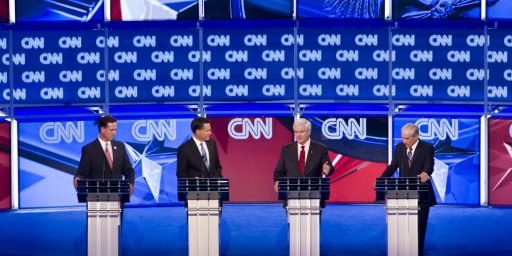
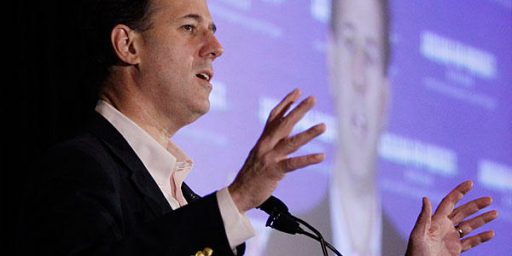
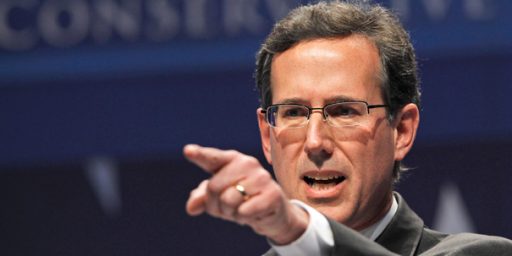
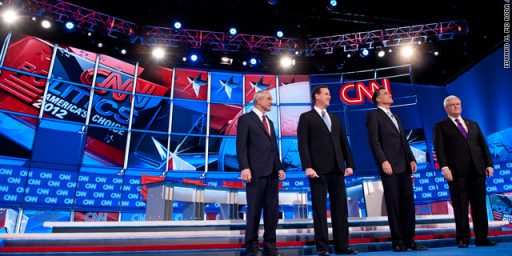
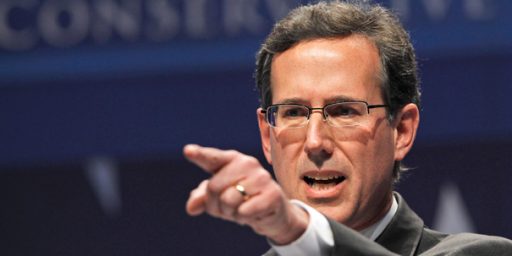
Welcome, my friend, to the “New Republic.”
Based on this, I guess ministers are no longer allowed First Amendment Freedom of Speech rights — except when they’re in the pulpit. Why wouldn’t people who are interested in public affairs be allowed to generate get out the vote activities separate from their employment? And, by a strict reading, I guess we won’t see any African-Americans greeting Democratic candidates in their pulpits — or the Rev.s Jackson or Sharpton mentioning political candidates? Oh, I’m sorry; conservative Republicans ministers must strictly follow the rules; Democrats make the rules…..
How is this a first amendment issue? They can say whatever they want, but if they violate rules for tax exempt organizations, they should pay taxes.
Brian, the thing you’re overlooking is that in recent years “censorship” has been totally redefined to include any discomfort of any kind that may be felt by any speaker saying anything at all under any circumstances.
Making pastors pay taxes if they engage in political activism from the pulpit, therefore, is alleged to be the equivalent of burning books and the people who read them.
Welcome to the post-modern republic.
I think the question of agency is what matters here. If the church is accepting an invitation to attend a conference or seminar, that’s fine. Even if they use church funds to attend it.
If they’re sponsoring it, or inviting only one side of the political spectrum to address them, then there’s a problem.